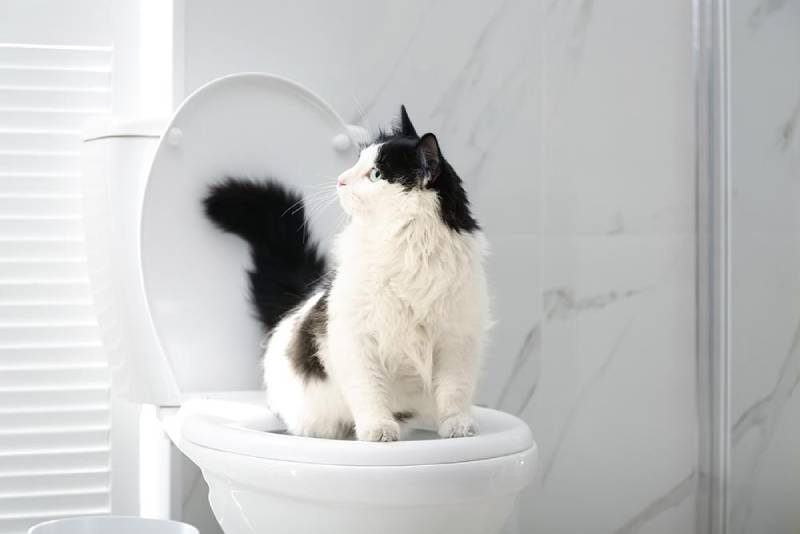Why You Shouldn't Flush Cat Poop Down Your Toilet - Preserve Your Plumbing Health
DetailsIn this article down the page you will find some exceptional advice pertaining to Don’t flush cat feces down the toilet.

Intro
As cat owners, it's necessary to be mindful of just how we dispose of our feline good friends' waste. While it might appear hassle-free to flush cat poop down the bathroom, this practice can have detrimental repercussions for both the atmosphere and human wellness.
Alternatives to Flushing
Fortunately, there are safer and a lot more accountable means to throw away pet cat poop. Take into consideration the following choices:
1. Scoop and Dispose in Trash
The most usual approach of disposing of cat poop is to scoop it right into a naturally degradable bag and toss it in the garbage. Make sure to make use of a committed litter inside story and take care of the waste immediately.
2. Usage Biodegradable Litter
Opt for eco-friendly pet cat litter made from products such as corn or wheat. These trashes are eco-friendly and can be safely taken care of in the garbage.
3. Hide in the Yard
If you have a yard, take into consideration burying pet cat waste in an assigned location far from veggie yards and water sources. Make sure to dig deep enough to avoid contamination of groundwater.
4. Install a Pet Waste Disposal System
Buy a family pet waste disposal system especially developed for pet cat waste. These systems make use of enzymes to break down the waste, decreasing odor and environmental impact.
Wellness Risks
Along with ecological problems, purging cat waste can likewise pose health and wellness threats to people. Pet cat feces may have Toxoplasma gondii, a parasite that can cause toxoplasmosis-- a potentially extreme ailment, specifically for expectant ladies and people with weakened immune systems.
Environmental Impact
Flushing feline poop presents dangerous virus and parasites right into the water, positioning a considerable risk to aquatic environments. These impurities can negatively impact marine life and concession water top quality.
Verdict
Responsible animal ownership expands beyond giving food and sanctuary-- it additionally involves appropriate waste administration. By avoiding flushing cat poop down the bathroom and going with alternative disposal methods, we can reduce our environmental impact and safeguard human wellness.
Why Can’t I Flush Cat Poop?
It Spreads a Parasite
Cats are frequently infected with a parasite called toxoplasma gondii. The parasite causes an infection called toxoplasmosis. It is usually harmless to cats. The parasite only uses cat poop as a host for its eggs. Otherwise, the cat’s immune system usually keeps the infection at low enough levels to maintain its own health. But it does not stop the develop of eggs. These eggs are tiny and surprisingly tough. They may survive for a year before they begin to grow. But that’s the problem.
Our wastewater system is not designed to deal with toxoplasmosis eggs. Instead, most eggs will flush from your toilet into sewers and wastewater management plants. After the sewage is treated for many other harmful things in it, it is typically released into local rivers, lakes, or oceans. Here, the toxoplasmosis eggs can find new hosts, including starfish, crabs, otters, and many other wildlife. For many, this is a significant risk to their health. Toxoplasmosis can also end up infecting water sources that are important for agriculture, which means our deer, pigs, and sheep can get infected too.
Is There Risk to Humans?
There can be a risk to human life from flushing cat poop down the toilet. If you do so, the parasites from your cat’s poop can end up in shellfish, game animals, or livestock. If this meat is then served raw or undercooked, the people who eat it can get sick.
In fact, according to the CDC, 40 million people in the United States are infected with toxoplasma gondii. They get it from exposure to infected seafood, or from some kind of cat poop contamination, like drinking from a stream that is contaminated or touching anything that has come into contact with cat poop. That includes just cleaning a cat litter box.
Most people who get infected with these parasites will not develop any symptoms. However, for pregnant women or for those with compromised immune systems, the parasite can cause severe health problems.
How to Handle Cat Poop
The best way to handle cat poop is actually to clean the box more often. The eggs that the parasite sheds will not become active until one to five days after the cat poops. That means that if you clean daily, you’re much less likely to come into direct contact with infectious eggs.
That said, always dispose of cat poop in the garbage and not down the toilet. Wash your hands before and after you clean the litter box, and bring the bag of poop right outside to your garbage bins.
https://trenchlesssolutionsusa.com/why-cant-i-flush-cat-poop/

As a serious person who reads on How to Dispose of Cat Poop and Litter Without Plastic Bags, I thought sharing that piece of content was a great idea. Liked our post? Please share it. Help another person check it out. Thanks for going through it.
Article